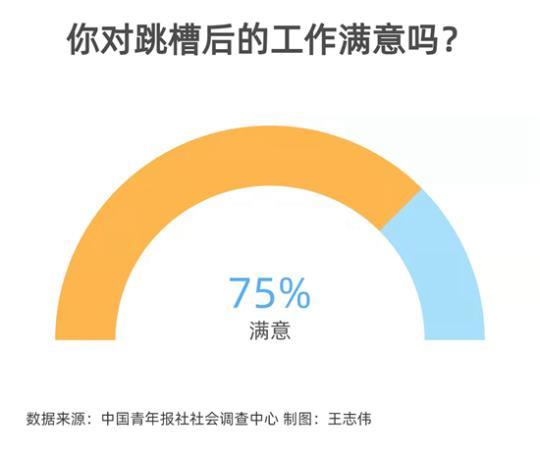75.0% of respondents are satisfied with their job after hopping
Respondents’ job satisfaction decreases as the number of job hopping increases
For many people in the workplace, job-hopping is a common phenomenon, and many people regard job-hopping as a springboard for promotion and salary increase.
How satisfied are the people in the workplace for the job after quitting?
Recently, a survey of 1154 respondents released by the Social Survey Center of China Youth Daily and the Social Survey Center (wenjuan.com) showed that 82.3% of the respondents have had job-hopping experience, and nearly half of the respondents have had two experiences. Time and above job-hopping experience.
75.0% of the interviewees expressed satisfaction with the job after hopping.
The analysis found that the job satisfaction of respondents decreased with the increase in the number of job-hopping.
75.0% of respondents are satisfied with their job after hopping
Yang Tong (pseudonym), born in 1995, who just graduated last year, chose to resign in April this year and changed to a job more related to his major.
"Because of the original job, I didn't know what to do or what I could do after I entered. I can only follow the arrangements of the leaders and colleagues every day. I am not motivated to work. Although I am very busy, I do not improve myself much. I chose to resign and find a job that is easier for me to get started."
Yang Tong feels very satisfied with his new job. Although the salary has not changed much compared with the past, fortunately, he has gained a group of like-minded friends and has made clear the direction of career development.
She feels that it is more important to find a platform to realize self-worth than to raise wages.
Zhou Haifeng (pseudonym) who works in Nanjing has had several job-hopping experiences. The last time he changed jobs was half a year ago when he switched to a Sino-foreign joint venture to do translation work.
He is very satisfied with his current job. "The salary has increased by 1/3 compared to the original, and the promotion channel is more transparent. The most important thing is to be able to leave work on time, so that he can have more time with his family."
The survey shows that 82.3% of the respondents have had job-hopping experience, of which 33.2% have had one time, 36.6% have had two times, and 12.6% have had three or more times.
75.0% of the interviewees expressed satisfaction with the job after hopping.
Interactive analysis found that the job satisfaction of respondents decreased with the increase in the number of job hopping. Respondents who hopped for 1 time had the highest job satisfaction, which was 80.4%.
Hu Peng (a pseudonym) born in the 90s, who now lives in Beijing, had his first job after graduation for more than two years, and then moved to a central enterprise. He admitted that he was a little dissatisfied with the new job.
He used to work in a secondary company of a centrally-owned enterprise. Although he needed to work at the grassroots level for 3 years, his benefits, work intensity, and working atmosphere were very good, and he had a high sense of happiness in life.
After changing to a new job, the salary not only did not increase, but was lower than before, and the workload was large, and overtime was often required.
"I feel a little regretful now that I shouldn't be anxious about signing a contract at that time, and should have more time to think about it."
Over 90% of respondents said they would be more cautious about changing jobs after the age of 30
Zhou Haifeng has just passed his 30th birthday some time ago, and he feels that if he changes jobs now, he will have more considerations.
On the one hand, it will pay more attention to the stability of the job. “Job-hopping is risky. Choosing the right one may lead to a further career. A wrong choice may affect the lives of individuals and family members. Therefore, the risk will be assessed before the job-hopping.” .
At the same time, career development prospects will also be given priority. He feels that as his personal experience increases, his career planning will be clearer, and the corresponding personal trial and error space will be smaller, so he will not easily change at the risk. The track, "Even if you want to change jobs, you must make a choice in a similar profession."
The survey shows that 91.0% of respondents believe that they will be more cautious about changing jobs after the age of 30.
Among them, 41.4% of the respondents believe that they will be more cautious when they are 30-34 years old, and 34.5% of the respondents believe that they should be more cautious when they are 35-39 years old.
Regarding the reasons for carefully considering job-hopping, 59.1% of the respondents said that an inadvertent choice would affect personal and family life, and 50.3% of the respondents believed that some positions have age restrictions.
Other reasons include: worrying about the difficulty of taking up new jobs (49.0%), the need to re-accumulate and work hard (48.3%), the overall employment situation is not good (34.2%), personal core competitiveness is reduced (21.6%), etc.
Although he is not satisfied with his current job, Hu Peng has no plans to change jobs in recent years. "Career development requires accumulation. Every job change requires a new start and re-accumulation. Although job-hopping may increase salary in the short term, But in the long run, it may not be beneficial to your career development."
In addition, he feels that job seekers should collect more information before hopping, such as company background, job content, work intensity, etc., to consider from multiple angles to minimize the risk of job hopping.
China Youth Daily·China Youth Daily reporter Wang Zhiwei Source: China Youth Daily

